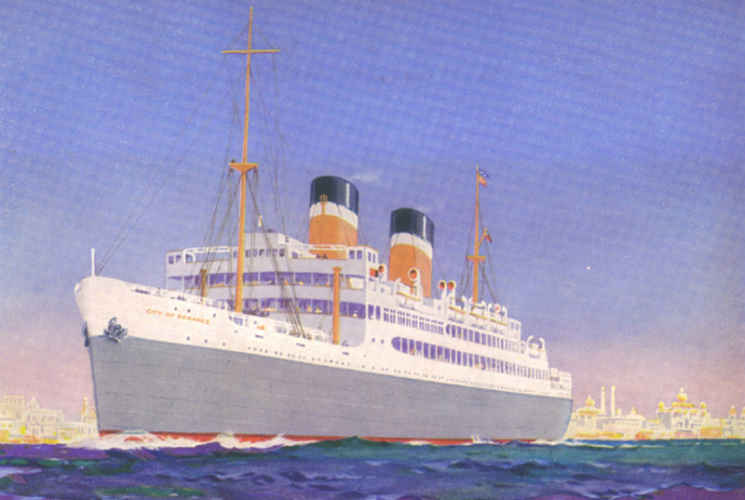My grandfather - Capt. John McMillan - was the her first master and at the time commodore of the Ellerman Line.
As a child the ship was part of my vocabulary as were various others such as the City of Simla that he
commanded.
I see in your text that you mention you received many contributions of pictures of the vessel. Do you by
chance have any pre-war ones ?
My grandfather retired just before the outbreak of war but was recalled to do work taking ships from Liverpool
up the Manchester Ship Canal when destined for the latter city. This enabled the sea-going masters to have
a break before their next voyage. In April 1940 he took one up ( I saw him on the quayside) and returned to
Liverpool by train and then by the underground railway to his home in Birkenhead over the Mersey. He had a
heart attack on the underground and died immediately. I remember that day very well. Incidentally one of his
brothers is buried in Melbourne (Vic).
An Ellerman postcard of their City of Benares of 1936.
Ellerman were one of the largest and most successful
British cargo liner groups and in the process this made
Sir John Ellerman the richest man in Britain, at the
outbreak of the First World War. They also had a more
modest passenger shipping involvement, mainly in the UK -
India and UK - South Africa trades. City of Benares was
built for Ellerman's Indian services. She was the only
Ellerman two funnel ship.
Evacuations of civilians in Britain during World War II,
were designed to save the population of urban or military
areas, from Nazi German aerial bombing of cities and
military targets such as docks. Civilians, particularly
children, were moved to rural areas thought to be less at
risk. Operation Pied Piper began on 1 September 1939 and
prior to the Battle of Britain officially relocated more
than 1.5 million people.
Further waves of official evacuation and re-evacuation
occurred from the south and east coast in June 1940, when
a seaborne invasion was expected and from affected cities
after the Blitz began in September 1940. There were also
official evacuations from the UK to other parts of the
British Empire, and many non-official evacuations, within
and from the UK.
The Children's Overseas Reception Board (CORB) was a
British organisation, that between July and September 1940
evacuated British children from the UK, in order to escape
the Blitz (and World War II more generally). The children
were sent to mainly to Canada, but also to Australia, New
Zealand, and South Africa. In the first few months over
210,000 children were registered with the scheme. The City
of Benares was used as a child refugee ship in the
overseas evacuation scheme, tragically sailing as part of
slow convoy OB-213, where she was a prime target and where
she was hit at the third attempt by U-48, at 00:01 on 18
September 1940. She sank within 30minutes killing 248
people, including 77 of the 90 children on board.
The overseas evacuation programme was immediately brought
to a halt. The Children's Overseas Reception Board had
already evacuated 2,664 children over a period of three
months.

